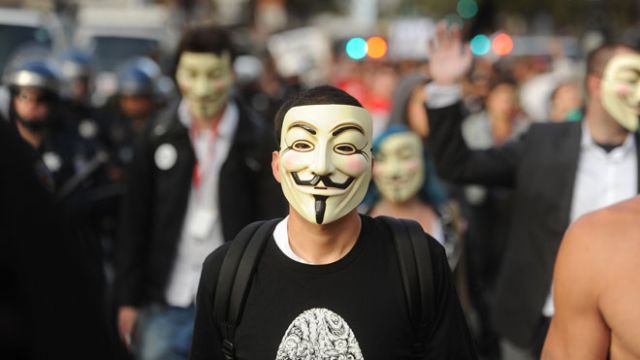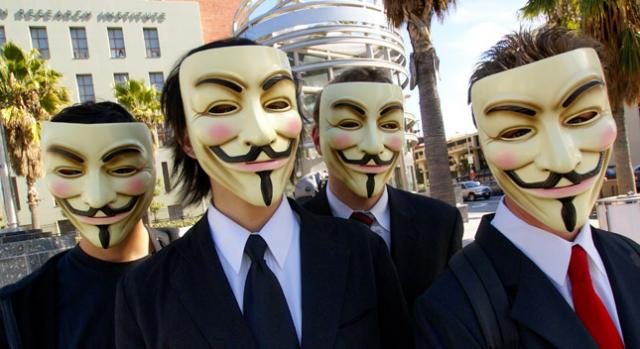
You probably recognize them by the Guy Fawkes masks they all don at public gatherings. You're probably aware they have no leader, spokesperson or hierarchy to speak of, as anyone can join ‘Anonymous'. And you probably read about their online “raids” and “takedowns” of targets as varied as the Church of Scientology, the U.S. Department of Justice and corporate opponents to Wikileaks.
But who exactly are these people telling us not to drink the Kool-Aid? How did a collective once rooted in silly pranksterism (i.e., disrupting Second Life games, memes, trolling and assorted rickrolling) come to redefine global dissent in the digital age? What drew thousands of “hacktivists” from all walks of life to band together in the name of freedom of expression and information?
Award-winning writer/director Brian Knappenberger (PBS/Frontline, National Geographic, Discovery) takes a stab at those lofty questions in his entirely self-funded We Are Legion: The Story of the Hacktivists, a fascinating primer on the group that FOX News hilariously dubbed “hackers on steroids”. NIGHTLIFE.CA spoke with Knappenberger about Anonymous' support of the Arab Spring, Occupy and our “Printemps Érable”, the cyber-war aimed at sabotaging Anonymous, and the threat posed by Anon's more radical “splinter” groups, reminding us that the collective is far from being unanimous…
1) 2011 was a banner year for hacktivism and countercultural movements worldwide, with Time Magazine even christening "The Protester" as its Person of the Year. Would you agree with those who've described Anonymous as the "internet's first army"?
In a way yes, I think taken as a whole Anonymous is something entirely new. A lot of its individual components aren't new – hacking isn't new, activism certainly isn't new, and even using computer systems and networks in a kind of politics of spectacle or disruption to make a political point isn't new. But considering the large number of people around the world who identify as Anonymous and the broad range of their activity, I think we are looking at a kind of culture that is very much new in the human experience. As for them being an army, I prefer the word 'culture,' but it can be intense how fast this hugely disorganized and decentralized group can focus their energies when they find something that angers them.
2) Can you tell us about the challenges to making a film wherein many of your (often masked) interviewees are in hiding, as they're either being hunted down by the FBI, private security firms or guerilla journalists?
We were careful in the way we conducted the interviews since our intent was never to out anyone. In fact it was quite the contrary, I wanted an authentic glimpse into the culture and to do that I needed people to trust me with their responses. This was tricky, so we did some interviews via Skype, some masked, voice distorted, etc. In each case I respected the level of anonymity the person I was talking to wanted.
3) I read that you first became aware of Anonymous back in 2008, when the collective carried out a massive worldwide campaign against the Church of Scientology. It all began with a very strange Tom Cruise indoctrination video and the organization's mistaken belief that it could erase any trace of it from the Internet. Do you think having a high-profile celebrity among its targets helped Anonymous gain broad exposure?
I guess so, but it's pretty clear that (as with a lot of things Anonymous has been involved in) it certainly wasn't organized or thought out in any way. I think they generally thought the video was funny, but what happened after that was a series of events that no single participant could have imagined or planned.

Credit for bottom photo: Valery Hache / AFP
4) You explore the ideological clash within Anonymous, between those building lines of solidarity with actual social movements and the more radical 'splinter groups', whose vicious campaigns aren't really concerned with collateral damage. Do you see this becoming more of an issue down the line? Could Anonymous' more "hardcore" factions tarnish its reputation as a collective of freedom fighting "internet warriors"?
This split is still very much alive. One of the key weaknesses of the group is that it can be tarnished or hijacked by a single individual on any given day with some ridiculous behavior. But as a whole they seem to be evolving in very interesting ways, mostly towards an awareness that (collectively) they can actually make some degree of difference in areas they care about – internet, speech, and protest freedoms, abuses of power, etc. I often wonder if smaller splinter groups will begin to break off and become "legitimate" (for lack of a better word.) You see many examples of this historically, where more extreme protest groups alter their approach and organize into powerful and necessary "legitimate" forces for good.
That said, I once thought Anonymous would be a Scientology-only protest group, so I'm usually careful not to make any broad based definitive predictions as to where the non-group is headed. I think we're still in a period where it is too early to tell how various factions will evolve. A friend once compared the array of possibilities of Anonymous to a deck of cards all fanned out. People who identify with Anonymous have a lot of choices as to where they can take their momentum.
5) In We Are Legion, you point out that both Bill Gates and Steve Jobs first cut their teeth doing these types of borderline-illegal electronic high jinks. Given hacking's storied history, are you surprised that most mainstream media outlets seems to equate Anonymous with hooliganism, cyber-bullying or even terrorism? Do you see that changing anytime soon, as the movement gains even more notoriety?
Not really, partly because members sometimes embrace that air of hooliganism. But there is no doubt that people who were once considered criminal hackers (and in a lot of cases faced some serious jail time) are now very much a part of the establishment, even recruited by the government for their skills.
6) Your film doesn't shy away from taking a clear stand on this contentious issue: you believe Anonymous' actions are legitimate. Were you concerned that the film would come off as too one-sided, as lacking in critical voices from the other end of the spectrum?
Well, I disagree with that. I think there is legitimacy in some of their actions but certainly not all. I definitely think we are in a period when the kinds of jail times people are facing often don't fit the crime – and the discussion about what is happening needs to become more sophisticated. But I don't for instance, believe that DDoS should be uncritically supported and always legal, it's a neutral tool that has even been used by oppressive regimes to shut down NGOs they don't like. And ultimately it is a tool for silencing websites, which means its use needs to be very carefully considered by anyone who believes in freedom of speech. I do think that in certain cases, where the activity is obviously a protest, there should be a first amendment carve out or at least consideration that it could be protected. It has to be a case by case basis, but not all of this activity should be across the board illegal.
I also disagree with those who have said I'm overly sympathetic, in the film we actually take Anonymous to task on a number of things – attacking the press, large scale doxing of people's personal information, etc.
Protesters sporting Guy Fawkes masks during Quebec's Maple Spring (Top picture credit: Rogerio Barbosa / AFP.COM)
7) Anonymous fought for Quebec students' right to demonstrate against proposed tuition hikes earlier this year in what's now been dubbed Canada's "Maple Spring". Had you heard about Anonymous' involvement with the student movement here? Do you think we'll increasingly see Anonymous championing causes that are perhaps more localized than an Arab Spring, but that are no less important?
Absolutely. I was watching that and I thought it was really interesting. The localized use of the Anon iconography and approach has already been happening all over the world and I expect it to continue and even expand. Almost any protest you go to around the world you will see people wearing a Guy Fawkes mask. In the film Quinn Norton says it has become a "package of dissent" that you can pick up anywhere in the world, for any cause you want. It's a very interesting phenomenon.
8) Anonymous has taken on targets as wide-ranging as Neo-Nazi shock jocks, the Church of Scientology and Egypt's former Mubarak government. Has it created a new template for international civil disobedience?
Yes, I think so. I may have stolen the thunder for this question in the previous one.
9) One of your interviewees, Aaron Barr, confirms that private security firms are actively trying to sabotage and discredit Anonymous. It's difficult not to draw parallels between that chilling avowal and [Wikileaks founder] Julian Assange's current legal troubles. Am I reading into this too much or would you agree?
I can't really speak to Julian's legal troubles on that level, but it's clear from the HBGary emails that Barr and his associates were at least discussing ways to discredit Wikileaks. The sorts of things they were considering were alarming to people who may be blissfully unaware that things like that are even happening. It was a glimpse into a kind of cyber-war that we don't often see and I think it's one of the main reasons why that email leak freaked out so many people. This may be going on all the time, but here was what seemed to be first hand proof.
10) When you began working on this film, Hosni Mubarak was still in power. So much has happened over the course of making We are legion, from the Egyptian revolution and the government takedown of Megaupload to Quebec's "Printemps Érable". How do you see Anonymous evolving over the next couple of years? Should we expect increasingly stiffer sentences for such acts of hactivism?
Unless we can shift the discussion a little I do fear the sentences might get stiffer. I also think that the outcomes of those currently facing trial, like the Anonymous 16 we profile in the film, will be a strong indicator as to how the future of our digital freedoms will be shaped. In some sense that discussion is about traditional values of speech, protest, etc. transferring to our online lives. It is groups like Anonymous that seem to be aware of these battles before anyone else.
We Are Legion: The Story of the Hacktivists
Now playing at Cinéma du Parc | cinemaduparc.com